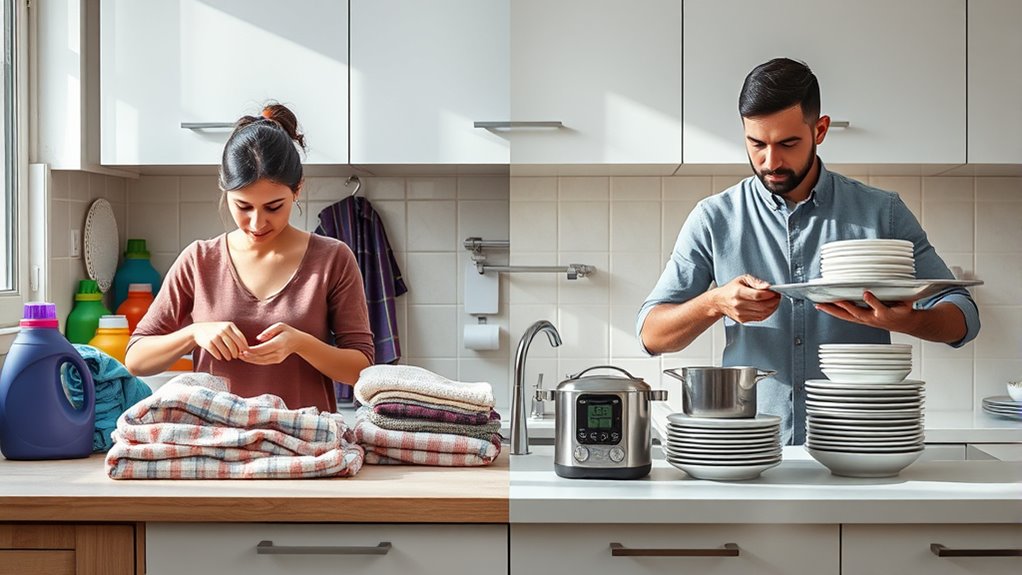You might think household chores are divided fairly or that caregiving is mainly a woman’s job, but that’s a myth. The reality shows chores often take more time than you realize, and equal sharing benefits relationships. Kids can and do contribute, building responsibility, and household labor can be measured to truly understand its impact. Challenging stereotypes helps create balance and respect at home. Keep exploring to discover how recognizing these facts can transform your household dynamics.
Key Takeaways
- Gender stereotypes wrongly suggest household chores should follow traditional roles, undervaluing domestic work for all genders.
- Many underestimate the actual time spent on chores; studies show household labor can be substantial and varies among individuals.
- Sharing household responsibilities equally improves relationships, reduces tension, and promotes fairness and mutual respect.
- Children actively participate in age-appropriate chores, developing responsibility, independence, and essential life skills.
- Recognizing household labor’s true value challenges stereotypes, promotes equality, and fosters respectful, balanced partnerships.
The Myth of Traditional Gender Roles in Household Tasks

Many people still believe that household chores should be divided along traditional gender lines, but this idea is a myth. Gender stereotypes and cultural expectations have long influenced how chores are assigned, often assigning domestic work to women and paid work to men. These stereotypes persist despite evidence showing that household responsibilities are shared more equally when freed from outdated beliefs. Cultural expectations shape perceptions of who should handle specific tasks, reinforcing roles that don’t reflect individual strengths or preferences. By challenging these stereotypes, you can promote a fairer distribution of chores, fostering equality and reducing unnecessary stress. Recognizing that household labor isn’t inherently tied to gender helps break down harmful myths and encourages a more balanced, modern approach to domestic responsibilities. Additionally, understanding privacy policies related to online resources can help individuals make informed decisions about their personal data and online interactions.
The Reality of Time Investment in Household Chores

Although perceptions often suggest that household chores take up a small fraction of your time, the reality is that the actual time invested can be substantial and varies widely among individuals. Your workload perception doesn’t always match the real hours spent, affecting your time management. Some may spend over an hour daily, while others allocate less. Recognizing this variation helps address workload disparities. Here’s a comparison:
| Perceived Time | Actual Time |
|---|---|
| Small fraction | Significant hours |
| Minimal effort | High commitment |
| Short duration | Extended periods |
| Limited impact | Major daily routine |
Understanding the true time investment in household chores can lead to better workload management, reducing stress and promoting fairness in sharing responsibilities. Being aware of time management strategies can further optimize how household tasks are allocated and completed.
Misconception: Household Labor Is Solely a Woman’s Responsibility

The misconception that household labor is solely a woman’s responsibility persists despite evidence showing that chores and caregiving are shared duties. This belief can hinder your financial planning and career development by reinforcing traditional roles that limit your opportunities. When household chores fall mainly on one person, it creates an imbalance that affects work-life balance and personal growth. Sharing household responsibilities allows both partners to pursue careers without feeling overwhelmed or guilty. It also encourages open communication, which is essential for making joint decisions about finances and long-term goals. By challenging this misconception, you can foster a more equitable environment that supports your professional ambitions and ensures household tasks are managed efficiently. Additionally, understanding the importance of shared responsibilities can lead to healthier relationships and better overall well-being. Ultimately, shared responsibility benefits your overall well-being and future stability.
The Fact About Equality and Household Responsibilities

You might believe household tasks are meant for one person, but true equality means sharing responsibilities fairly. When both partners participate, it promotes fairness and challenges outdated gender roles. Everyone benefits when household tasks are divided evenly, fostering a more balanced and respectful home. Recognizing the importance of skincare innovation can also reflect a broader commitment to fairness and quality in daily routines.
Shared Responsibilities, Fairness
Shared responsibilities in household chores are essential for creating a fair and balanced environment. When chores are divided equitably, everyone benefits, and fairness becomes a reality. It allows you to maintain your financial independence by reducing the burden on one person and promoting mutual respect. Cultural expectations often influence how chores are assigned, but challenging these norms fosters true equality. By sharing tasks, you ensure that responsibilities aren’t unfairly placed on one individual, which helps build trust and understanding. Fairness in household duties encourages open communication and shared accountability. It’s not about strict equal division but about ensuring everyone contributes according to their abilities and circumstances. Recognizing the importance of ethical considerations in household responsibilities can lead to more respectful and effective cooperation. When responsibilities are shared, you create a household where fairness prevails, strengthening relationships and promoting harmony.
Gender Roles, Household Tasks
Although traditional gender roles have historically shaped household responsibilities, achieving true equality means challenging these stereotypes and redefining expectations. Today, technology integration and household automation offer tools to balance tasks more fairly. Automated appliances, smart home devices, and app-controlled systems reduce the burden of chores and help distribute household tasks more evenly. By embracing these innovations, you can break free from outdated notions that only women handle domestic duties. Encouraging shared responsibilities becomes easier when everyone can leverage technology to streamline chores. This shift not only promotes equality but also fosters a partnership based on cooperation and respect. Ultimately, redefining gender roles with the help of household automation empowers you to create a more balanced and inclusive home environment.
Common Belief: Kids Are Not Involved in Household Chores

Many people assume that kids don’t get involved in household chores, but in reality, children often participate in age-appropriate tasks around the home. Teen chores are a common way for kids to contribute, whether it’s cleaning their room, doing laundry, or helping with meal prep. Parental involvement plays a vital role in encouraging this participation, setting expectations, and teaching responsibility. When parents involve kids in chores early on, it fosters independence and teamwork. Contrary to the belief that children are passive observers, many kids actively help out and learn valuable life skills. Additionally, understanding the benefits of age-appropriate chores can help parents create more structured and effective household routines. Recognizing their contributions helps break down stereotypes and promotes a more balanced view of household labor sharing within families.
The Truth About Children’s Participation in Household Tasks

Children actively participate in household tasks more often than people assume, especially when parents encourage their involvement. When you foster their chore motivation, kids develop teen independence and a sense of responsibility early on. Many underestimate their willingness to contribute, but with proper guidance, children zealously take on age-appropriate chores. This involvement not only lightens your load but builds life skills. To visualize, here’s a quick comparison:
| Impact of Children’s Participation | Benefits |
|---|---|
| Boosts teen independence | Fosters responsibility |
| Enhances chore motivation | Develops time management skills |
| Encourages teamwork | Builds confidence |
| Promotes good habits | Prepares for future tasks |
| Strengthens family bonds | Creates a shared sense of duty |
Understanding their potential helps you motivate kids to participate actively. Effective leadership in guiding children’s chores can foster a positive and productive household environment.
The Myth That Household Labor Cannot Be Quantified

While getting children involved in household chores helps develop responsibility and skills, a common misconception persists: household labor is too varied and informal to be measured accurately. However, this myth ignores the growing methods to quantify this work and its true financial impact. Consider these points:
- Time tracking apps help calculate how much time is spent on chores across different households.
- Cultural differences influence how household labor is valued and reported.
- Studies reveal that unpaid household work contributes profoundly to the economy.
- Recognizing household labor’s financial impact highlights its importance, regardless of its informal nature. Additionally, measurement techniques are continually evolving to better capture the scope of household work.
The Actual Impact of Fair Distribution of Chores on Relationships

When chores are shared fairly, you’ll notice daily tensions decrease, making your home a calmer place. This balance also shows mutual respect, helping both of you feel valued and understood. Over time, it can strengthen your emotional connection, fostering a more supportive relationship. Additionally, recognizing and addressing warning signs of disengagement can prevent small issues from escalating into larger conflicts.
Reduces Daily Tensions
Fairly distributing household chores can considerably lower daily tensions in your relationship. When chores are shared equally, you spend less time arguing and more time enjoying each other’s company. This balance improves your time management, allowing you to plan your days better and avoid last-minute stress. Plus, it reduces stress levels, making daily interactions calmer and more positive. Here are four ways this helps:
- Prevents resentment from building up over unequal workload
- Promotes open communication about expectations
- Creates a more predictable daily routine
- Enhances emotional well-being through shared responsibility
Fosters Mutual Respect
Sharing household chores equally demonstrates that both partners respect each other’s time and efforts. When chores are divided fairly, it challenges cultural stereotypes that often assign household management primarily to one person, usually women. This fairness shows appreciation for each other’s contributions, fostering mutual respect. It signals that you value your partner’s effort and recognize household management as a shared responsibility. This respect builds a healthier foundation for your relationship, reducing feelings of resentment or inequality. By actively participating in household tasks, you demonstrate that you see your partner as an equal, which encourages open communication and trust. Ultimately, fair chore distribution reinforces mutual respect, creating a balanced partnership where both individuals feel appreciated and valued. Recognizing the importance of cultural and regional breakfast traditions can further promote understanding and appreciation within shared routines.
Strengthens Emotional Bonds
Distributing household chores evenly does more than just promote respect; it also deepens emotional connections between partners. When chores are shared fairly, you foster trust and understanding**, reinforcing positive family dynamics. This balance shows you value** each other’s contributions, making you feel more connected. Here are four ways this impacts your relationship:
- Creates a sense of teamwork, strengthening your emotional bond.
- Reduces resentment, allowing for open, honest communication.
- Builds mutual appreciation, boosting overall relationship satisfaction.
- Encourages empathy, deepening your emotional connection daily.
Debunking the Idea That Household Labor Is Always Recognized and Valued

Although household labor is essential for daily life, it’s often overlooked when it comes to recognition and valuation. Many people believe that gender stereotypes and cultural expectations shape this mindset, making household chores seem like women’s work. These stereotypes suggest that household tasks are less important or even natural for women, leading to their undervaluation. As a result, the effort you put into managing a household often goes unnoticed or unappreciated, despite its critical role in maintaining daily life. Recognizing household labor requires challenging these ingrained beliefs and shifting cultural expectations. It’s time to debunk the myth that household work is always acknowledged and valued, and to acknowledge its true importance regardless of gender.
Frequently Asked Questions
How Do Cultural Differences Influence Household Labor Perceptions?
Cultural differences shape how you view household labor by reinforcing stereotypes and gender expectations. You might see domestic chores as primarily women’s work due to societal norms, or perceive sharing responsibilities as fair based on cultural values. These beliefs influence how you assign tasks and judge fairness, often making it harder to achieve an equitable balance. Recognizing these cultural influences helps you challenge stereotypes and promote a more equal distribution of household labor.
What Role Does Workplace Flexibility Play in Household Chore Sharing?
You might notice that workplace flexibility often encourages better work-life balance, making it easier for you to share household chores. When your employer offers flexible hours or remote work options, you’re more likely to be involved in parental duties and household tasks. This flexibility helps break traditional gender roles, fostering equitable chore sharing, and strengthening family bonds. Ultimately, adaptable work policies support your active parental involvement and create a more balanced home life.
How Can Technology Help Balance Household Labor More Fairly?
Technology can help you balance household labor more fairly through smart scheduling and task automation. With smart scheduling, you can assign chores based on everyone’s availability, ensuring a fair distribution. Task automation, like robotic vacuum cleaners or smart dishwashers, reduces your workload and frees up time for shared responsibilities. These tools make household management more efficient, encouraging cooperation and fairness in sharing chores.
What Psychological Effects Result From Unequal Household Task Distribution?
Imagine you’re constantly overwhelmed with chores, feeling emotionally stressed and anxious—that’s often the result of unequal household task distribution. When chores aren’t shared fairly, your mental health can decline, leading to feelings of frustration, resentment, and burnout. This imbalance damages emotional well-being, making it harder to relax or enjoy quality time. Addressing this uneven workload helps reduce emotional stress and promotes better mental health for everyone involved.
How Do Socioeconomic Factors Impact Household Chore Responsibilities?
Socioeconomic factors greatly influence household chore responsibilities. You’ll find that gender norms often dictate expectations, with women typically taking on more tasks regardless of income. Economic disparities can limit resources, making chores more burdensome for lower-income households. These factors shape who does what, reinforcing traditional roles and impacting everyone’s overall well-being. Recognizing these influences helps you understand the systemic nature of household labor and the importance of addressing inequality.
Conclusion
You might think household chores are just tiny drops in a vast ocean, but in reality, they’re the tidal waves shaping your relationships and daily peace. When you break free from outdated myths and share the load equally, it’s like turning a chaotic storm into a calm, sunny sky. Don’t let the invisible chore mountain grow any taller—recognize, value, and balance household labor, or risk drowning in the chaos forever!
As our Lead Writer, Mia has a talent for turning complex ideas into compelling narratives. With a rich background in writing and a deep passion for psychology, Mia’s articles provide insightful, accessible explorations of narcissistic behavior and its impact on individuals and relationships. Mia’s contributions are thought-provoking and offer practical advice for our readers.











